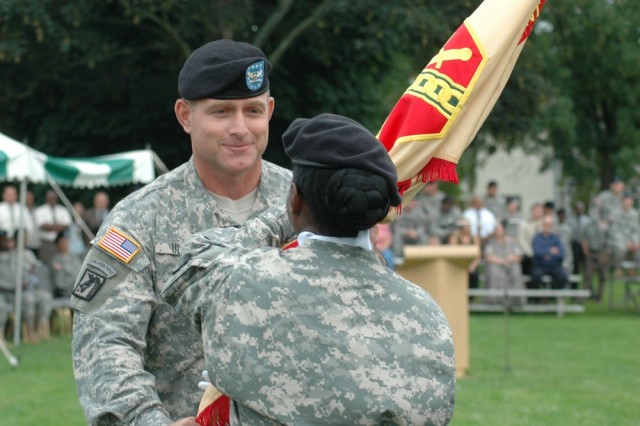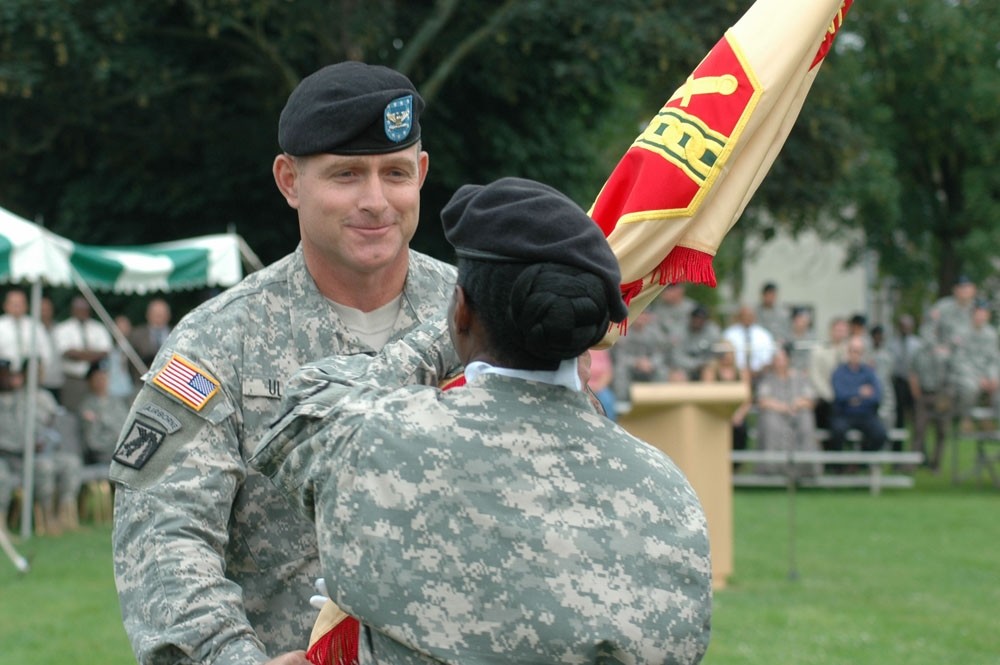HEIDELBERG, Germany - Force protection, providing quality services and team-building are the top priorities for U.S. Army Garrison Heidelberg's new commander.
Col. Robert Ulses, who assumed command of USAG Heidelberg today from Col. Willie Gaddis, said the garrison plays a vital role in the global war on terrorism and providing quality support services to a population of approximately 46,000 Soldiers, Family members, civilian employees, contractors and military retirees.
Moreover, he believes ensuring the safety of community is paramount.
"My goal is to protect the force here," he said. "As garrison commander, I will continue (to) enhance what I see as a good force protection program."
By serving as a projection platform for GWOT, he said, USAG Heidelberg is responsible for preparing, deploying and reintegrating Soldiers as they support operations in Iraq and Afghanistan.
"I want to improve upon those capabilities for Soldiers deploying and returning from theater," he said, adding that the garrison also is in the fight.
"We are in the global war on terrorism here," he said, citing recent bombings and attempted terrorist attacks occurring in Europe. "I view us in the global war on terrorism because it is anywhere and everywhere."
Ulses arrived here from the Military Deputy to the Assistant Secretary of the Army for Financial Management and Comptroller's office at the Pentagon, where he served as its executive officer.
"I am a survivor of the (Sept. 11, 2001) Pentagon attack. I was in the building at the time," Ulses said. "The people in the Pentagon did not think they were in the global war on terrorism until it happened."
Having served in numerous units - line and staff - and all levels of leadership, the colonel said he will use his experience as a consumer of garrison services to shape the command.
"I've been a user or tenant of many garrisons," he continued. "As a battalion commander, I did a lot of work with the garrison. I plan to bring those experiences to this assignment."
Ulses said the garrison's successes will be determined with measures such as the Interactive Customer Evaluation service, commonly called ICE, and face-to-face assessments.
"I will (visit) the community and talk with tenant units. I will get honest feedback from them," he said. "I like to see where they work and play. I will talk to Soldiers and civilians throughout the community."
"I will try to do everything I can to provide the quantity and quality services and support that the community expects, given the resources that are available to me," he added.
A self-described hands-on leader, Ulses said his task as a leader is to provide guidance and oversight to a professional staff that gets the job done.
"They have their mission, and I will empower them to do it. I trust them to do so."
Referring to his predecessor, Ulses said: "I know Col. Gaddis has this garrison operating as an effective and efficient organization. I will reinforce his great work by emphasizing a sense of pride, poise and teamwork in everything that we do."
Comparing the garrison to a large city and its commanders as mayors, Russell Hall, Installation Management Command - Europe director, said Gaddis oversaw his community as well as any large city's elected leaders.
"He not only managed the intricacies of city management; with his leadership skills (he) built a strong command team," Hall said. "He made it his business not only to administer this city but to personally know its constituents and to take their needs to heart," Hall said.
"Col. Gaddis, your ability to streamline processes, implement improvement, manage new construction projects and champion the standard garrison organization and structure is your true legacy," he added.
Addressing, for the last time, those he had led and worked with as garrison commander, Gaddis said the people here have the skills and dedication needed in making a significant GWOT contribution while ensuring the Army in Europe's transformation is successful.
If USAG Heidelberg were a football team, Gaddis said, it "would have tremendous bench strength."
"The bottom line is that we have the right people at the right place helping us transform Europe as part of the Army transformation, fight the global war on terror and take care of Soldiers," he said shortly after relinquishing command to Ulses.
Listing achievements from each of the garrison's four military communities, Gaddis praised members for their accomplishments and contributions.
"Throughout these garrisons there is a common thread: it's all about dedication, team spirit and professional pride," Gaddis noted. "You can see it at our enduring garrisons and you see it at installations slated for closure."
Gaddis said his secret to his success was a combination of being in the right assignment at the perfect time and the opportunity to work with the right people.
"In a few years I will have forgotten how many dollars we spent, how many people attended our many events and probably my APO address," he said. "What I will remember is the talent, the spirit and the help of the people I worked with."
Gaddis will assume duties as the Military Distinct of Washington's chief of staff.


Social Sharing